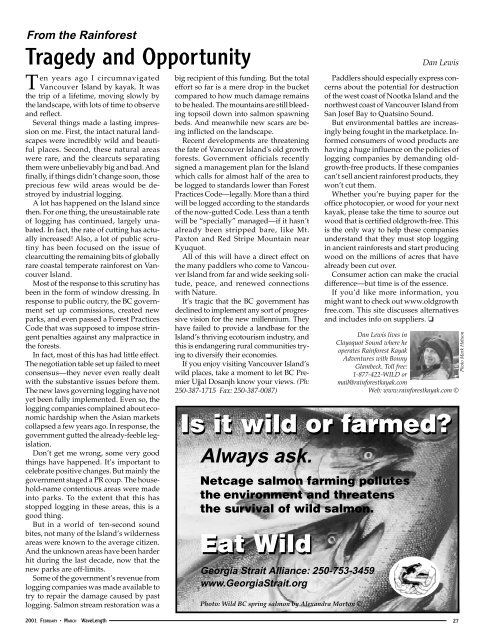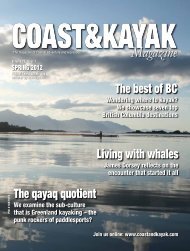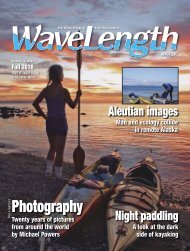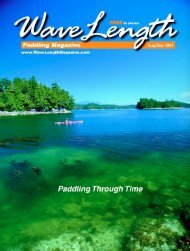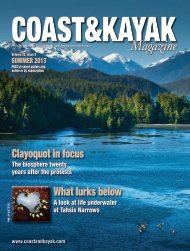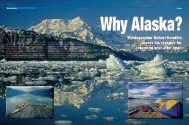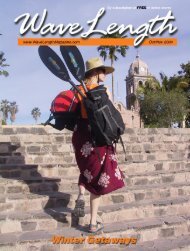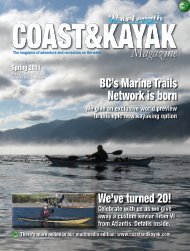Alexandra - Wavelength Paddling Magazine
Alexandra - Wavelength Paddling Magazine
Alexandra - Wavelength Paddling Magazine
You also want an ePaper? Increase the reach of your titles
YUMPU automatically turns print PDFs into web optimized ePapers that Google loves.
From the Rainforest<br />
Tragedy and Opportunity Dan Lewis<br />
Ten years ago I circumnavigated<br />
Vancouver Island by kayak. It was<br />
the trip of a lifetime, moving slowly by<br />
the landscape, with lots of time to observe<br />
and reflect.<br />
Several things made a lasting impression<br />
on me. First, the intact natural landscapes<br />
were incredibly wild and beautiful<br />
places. Second, these natural areas<br />
were rare, and the clearcuts separating<br />
them were unbelievably big and bad. And<br />
finally, if things didn’t change soon, those<br />
precious few wild areas would be destroyed<br />
by industrial logging.<br />
A lot has happened on the Island since<br />
then. For one thing, the unsustainable rate<br />
of logging has continued, largely unabated.<br />
In fact, the rate of cutting has actually<br />
increased! Also, a lot of public scrutiny<br />
has been focused on the issue of<br />
clearcutting the remaining bits of globally<br />
rare coastal temperate rainforest on Vancouver<br />
Island.<br />
Most of the response to this scrutiny has<br />
been in the form of window dressing. In<br />
response to public outcry, the BC government<br />
set up commissions, created new<br />
parks, and even passed a Forest Practices<br />
Code that was supposed to impose stringent<br />
penalties against any malpractice in<br />
the forests.<br />
In fact, most of this has had little effect.<br />
The negotiation table set up failed to meet<br />
consensus—they never even really dealt<br />
with the substantive issues before them.<br />
The new laws governing logging have not<br />
yet been fully implemented. Even so, the<br />
logging companies complained about economic<br />
hardship when the Asian markets<br />
collapsed a few years ago. In response, the<br />
government gutted the already-feeble legislation.<br />
Don’t get me wrong, some very good<br />
things have happened. It’s important to<br />
celebrate positive changes. But mainly the<br />
government staged a PR coup. The household-name<br />
contentious areas were made<br />
into parks. To the extent that this has<br />
stopped logging in these areas, this is a<br />
good thing.<br />
But in a world of ␣ ten-second sound<br />
bites, not many of the Island’s wilderness<br />
areas were known to the average citizen.<br />
And the unknown areas have been harder<br />
hit during the last decade, now that the<br />
new parks are off-limits.<br />
Some of the government’s revenue from<br />
logging companies was made available to<br />
try to repair the damage caused by past<br />
logging. Salmon stream restoration was a<br />
2001 FEBRUARY • MARCH WaveLength<br />
big recipient of this funding. But the total<br />
effort so far is a mere drop in the bucket<br />
compared to how much damage remains<br />
to be healed. The mountains are still bleeding<br />
topsoil down into salmon spawning<br />
beds. And meanwhile new scars are being<br />
inflicted on the landscape.<br />
Recent developments are threatening<br />
the fate of Vancouver Island's old growth<br />
forests. Government officials recently<br />
signed a management plan for the Island<br />
which calls for almost half of the area to<br />
be logged to standards lower than Forest<br />
Practices Code—legally. More than a third<br />
will be logged according to the standards<br />
of the now-gutted Code. Less than a tenth<br />
will be “specially” managed—if it hasn’t<br />
already been stripped bare, like Mt.<br />
Paxton and Red Stripe Mountain near<br />
Kyuquot.<br />
All of this will have a direct effect on<br />
the many paddlers who come to Vancouver<br />
Island from far and wide seeking solitude,<br />
peace, and renewed connections<br />
with Nature.<br />
It’s tragic that the BC government has<br />
declined to implement any sort of progressive<br />
vision for the new millennium. They<br />
have failed to provide a landbase for the<br />
Island’s thriving ecotourism industry, and<br />
this is endangering rural communities trying<br />
to diversify their economies.<br />
If you enjoy visiting Vancouver Island’s<br />
wild places, take a moment to let BC Premier<br />
Ujjal Dosanjh know your views. (Ph:<br />
250-387-1715 Fax: 250-387-0087)<br />
Always ask.<br />
Netcage salmon farming pollutes<br />
the environment and threatens<br />
the survival of wild salmon.<br />
Georgia Strait Alliance: 250-753-3459<br />
www.GeorgiaStrait.org<br />
Photo: Wild BC spring salmon by <strong>Alexandra</strong> Morton ©<br />
Paddlers should especially express concerns<br />
about the potential for destruction<br />
of the west coast of Nootka Island and the<br />
northwest coast of Vancouver Island from<br />
San Josef Bay to Quatsino Sound.<br />
But environmental battles are increasingly<br />
being fought in the marketplace. Informed<br />
consumers of wood products are<br />
having a huge influence on the policies of<br />
logging companies by demanding oldgrowth-free<br />
products. If these companies<br />
can’t sell ancient rainforest products, they<br />
won’t cut them.<br />
Whether you’re buying paper for the<br />
office photocopier, or wood for your next<br />
kayak, please take the time to source out<br />
wood that is certified oldgrowth-free. This<br />
is the only way to help these companies<br />
understand that they must stop logging<br />
in ancient rainforests and start producing<br />
wood on the millions of acres that have<br />
already been cut over.<br />
Consumer action can make the crucial<br />
difference—but time is of the essence.<br />
If you’d like more information, you<br />
might want to check out www.oldgrowth<br />
free.com. This site discusses alternatives<br />
and includes info on suppliers. ❏<br />
Dan Lewis lives in<br />
Clayoquot Sound where he<br />
operates Rainforest Kayak<br />
Adventures with Bonny<br />
Glambeck. Toll free:<br />
1-877-422-WILD or<br />
mail@rainforestkayak.com<br />
Web: www.rainforestkayak.com ©<br />
Is it wild or farmed?<br />
Eat Wild<br />
27<br />
Photo Mark Hobson


